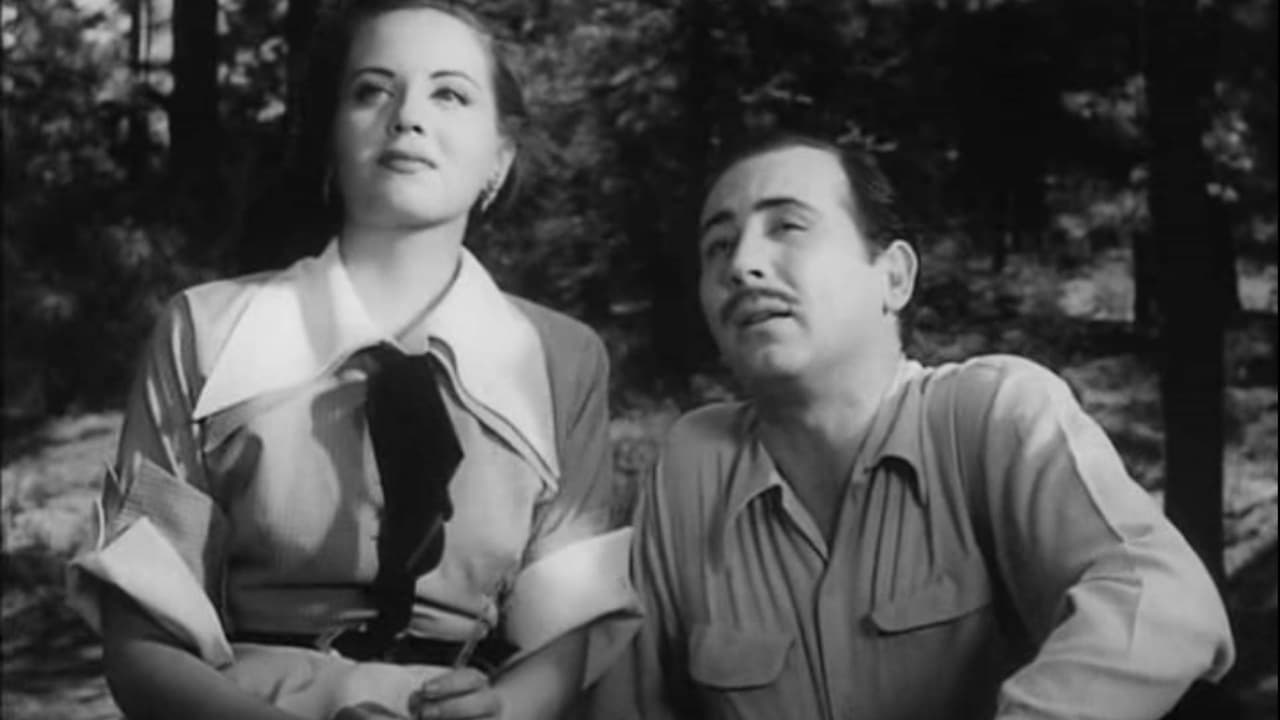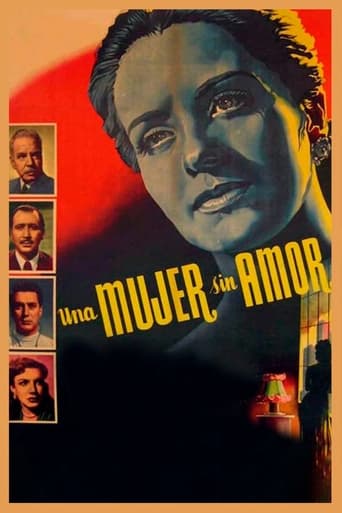Matialth
Good concept, poorly executed.
Yash Wade
Close shines in drama with strong language, adult themes.
Gary
The movie's not perfect, but it sticks the landing of its message. It was engaging - thrilling at times - and I personally thought it was a great time.
Haven Kaycee
It is encouraging that the film ends so strongly.Otherwise, it wouldn't have been a particularly memorable film
Claudio Carvalho
In Mexico, Rosario (Rosario Granados) has a marriage of convenience without love with her husband Don Carlos Montero (Julio Villarreal), who is a rigid and conservative antiquarian older and older than she. When Don Carlos punishes their son Carlitos (Jaime Calpe) without listening to him, the boy runs away from home. The engineer Julio Mistral (Tito Junco) finds Carlitos and brings him home, becoming a family friend. Soon Rosario and Julio fall in love with each other and have a love affair. Julio invites Rosario to move with him to Brazil with Carlitos but Don Carlos has a heart attack on the day that they would be traveling. Rosario sacrifices her true love to stay with Don Carlos and Carlitos. Many years later, Carlos (Joaquín Cordero) and his younger brother Miguel (Javier Loya) are graduated in medicine and love the same woman, Luisa (Elda Peralta). They both plan to rent a building for a medical clinic and work together. Out of the blue, a notary that is friend of the family tells that Julio has died and left his fortune to Miguel that was chosen by Luisa. The envious and male chauvinist Carlos questions the fidelity of his mother and the biological origin of his brother. "Una mujer sin amor", a.k.a. "A Woman Without Love", is a movie directed by Luis Buñuel with a melodramatic story of a woman that needs to choose between her true love and her family and the consequences of her choice in a chauvinist society. The gossips have never reached Carlos Montero or Miguel, but the weak and detestable Carlos. The conclusion can be easily understood by Latinos, with the brothers making up. My vote is seven.Title (Brazil): "Uma Mulher Sem Amor" ("A Woman Without Love")
MartinHafer
Like the films by director Luis Bunuel from the early 1950s, this one is much more direct and normal than his later films. The surrealism or anti-church themes of his work of hi and b earliest and later work is not evident here, though the film does still manage to challenge conventional morality and the idea of the happy family—also a theme in some of his later films. In this case, the film is about a marriage without much love and how a brief affair can come back to haunt you many years later. It comes from a short story by Guy de Maupassant.Rosario is a pretty young lady married to an older and somewhat cold man. She came from a poor family and marrying this prosperous antiques dealer offered her security but no passion. When their young son runs away, his parents are naturally hysterical. A nice man (Mr. Mistral) finds the boy and returns him home. But instead of just thanking the man, the happy father welcomes the man as a new friend and part of the family. All is initially good, but this also places the handsome young man and Rosario together—leading to them eventually falling in love. While the film does not say it directly, you learn later that they'd had a sexual encounter, as a child (Miguel) was born months after the relationship ended. No one but the two ex-lovers know that Miguel is their child and the unsuspecting husband just assumes the boy is his child.Twenty years later, a lawyer arrives to announce Mistral, a man they knew two decades ago, has died and inexplicably left his fortune to Miguel—a child he never even met. No one seems to think this odd—until later. Due to the prodding by an evil nurse who works with the two brothers (who are now both doctors), she gets the older brother to question WHY the younger brother has gotten the inheritance. This gets the older brother thinking—and a rift soon develops between the siblings. It's obvious that this is eating at the older brother's soul. This continues for some time and the viewer is left on the edge of their seat anticipating some sort of confrontation. How will the secret come out and what will become of this family?! I have seen quite a few Mexican films over the years (including several from Bunuel from this era) and I must say that "A Woman Without Love" is a standout film for several reasons. The most obvious is the quality of the production. This one looks as good as anything Hollywood was making at the time—and it's a lot nicer looking and more professional than a typical Mexican film. This may sound a bit rude, but it is clearly a much better looking film than was typical of this film industry. Additionally, the acting and direction are terrific—very direct and well-crafted. In fact, I am not sure the film could have been made much better had it been made elsewhere or with a more famous international cast. In addition, the story is very interesting and poses some interesting moral questions—it definitely makes you think and it's hard to watch it impassively.
Galina
Luis Buñuel thought that "Woman Without Love" was the worst movie he ever made and he wrote about it in his autobiography, "I'd been told to set up a screen on the set and just copy André Cayatte's movie (1943 film version of Guy de Maupassant's Pierre et Jean) scene by scene. Not surprisingly, I made it my own way, but it was still a disaster". I don't agree with him. I believe that he never made a bad film - he simply could not. Even if it lacks in his trademark surrealism, it still has his intelligence, his craft, and the ability to make a rather forgettable melodrama interesting and insightful. I am sure many directors would be proud of Woman Without Love. With changing the title of the movie and Maupassant's novella from Pierre et Jean to Woman Without Love, Buñuel, focuses on one of his favorite subjects - couple in love longing for each other and their inability to fulfill their desire due to all types of obstacles, social and religious, is evidently present in the film and elevates it above countless soap-operas. It is beautiful; it moves well, it is based on the writings by a talented writer. I like the acting, and the finale was not disappointing. "A woman without Love" may not be the best Luis Buñuel's film but as his devoted fan, I could not skip it and I am glad that I saw it.
Polaris_DiB
Luis Bunuel is known for his surrealist stuff, but let us remember that he is something of a leftist and well capable of delivering entertainment-for-the-lower-class: a.k.a., melodrama. This movie is consummate melodrama, following all the forms and procedures. Frankly, the directing and cinematography are absolutely gorgeous and Bunuel shows up so many contemporary and subsequent filmmakers with his form (and, may I add, focuses on dramatic blocking the type which puts this film up to Hitchcock-level directing). However, by five minutes in you know the story through and through because it's not only been done before, but regurgitated a million times since. Heck, instead of those American-Hispanic soap opera channels they have in the Southwest, they could just replace all of that with this film on a loop! For people who like melodrama, this movie is absolutely perfect and they should just buy it now. For others, it may be interesting as a small drama if they feel they want to spend the time (lucky thing: short running time). For the most part, however, Bunuel is smarter than this and this is as close as I've seen him get to "for a paycheck" style work.--PolarisDiB


